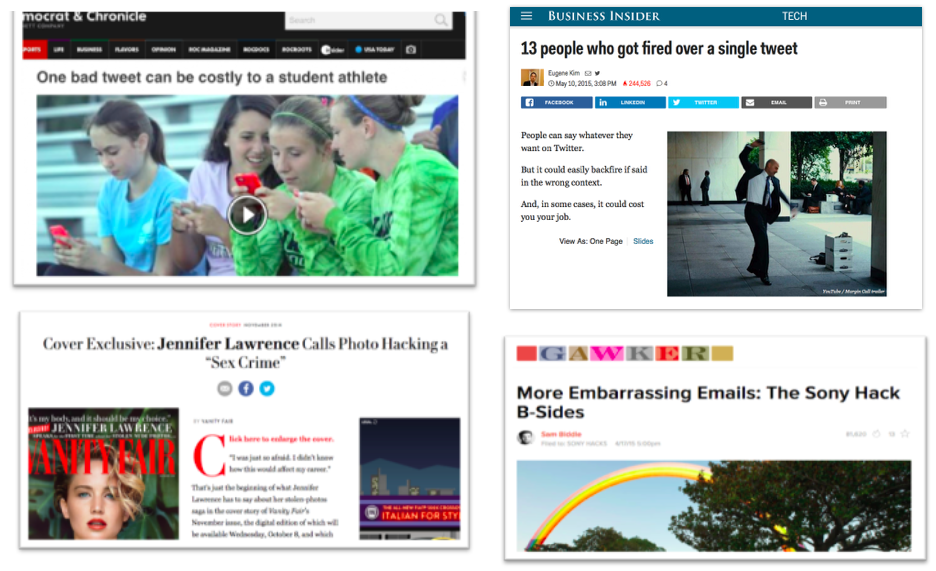2015 was an eventful year for the online reputation management industry. In June, Brand.com – not to be confused with my company, BrandYourself.com – vanished overnight. Later in the year, the oldest player in the field, Reputation.com, announced it was replacing its founder and CEO, Michael Fertik.
With major shakeups like this, it’s impossible not to wonder what’s going on. Is the market shrinking? Is the industry dying? Do less people need to improve how they look online?
As a co-founder and CEO in the online reputation management space, I thought I’d share my perspective on the marketplace, the industry, why traditional companies are struggling right now, and four important ways the industry is going to evolve. In doing so, I’d like to explain how BrandYourself plans to be part of the industry’s disruption, making the process easy and accessible to everyone.
I will discuss five major points:
- Although traditional reputation management companies seem to be struggling, the need for ORM tools is actually growing and so is the market.
- While the market is growing, traditional reputation companies are struggling because their business model isn’t built to support that growth.
- Since their business models support outdated, ineffective methods, they are forced to deceive people to get customers. This just needs to stop.
- There are new approaches that are better for customers. These will help set new standards for the industry going forward, something my company aims to do.
- On top of that, the industry needs to do more than help people repair reputation problems. It needs to help people prevent problems and proactively improve their online presence, something my company aims to do as well.
Although traditional reputation management companies seem to be struggling, the market is actually growing.
When you zoom out and take a look at what’s going on in the world — culturally and technologically — the recent shakeup in our industry doesn’t seem to add up. How could companies be struggling when, if anything, it seems like people need these services more than ever?
People need ORM services more than ever for a few simple reasons:
- Anyone can say anything about you online without getting in trouble, whether it’s true or not. It can ruin your career and there is little you can do: Think about it. If you upset anyone — an ex, a fired employee, someone you get a promotion over — they can go virtually anywhere online and trash you. Damaging results appear for this reason all the time and there is very little protecting you; in fact, more laws protect the publishers in these situations. When you combine this with the fact that employers, customers and even dates increasingly screen you online for negative information, you can imagine how this may seriously affect you.
- Everything we do is now recorded online forever, which means we need more tools to make sure this doesn’t harm us. We do everything online and we now have the technology to track and store all that activity. That means everything we post on Facebook, everything we tweet, every item we search for, every website we visit, every online transaction we make, every conversation we have through text or Messenger exists somewhere. A Facebook status update you made a year ago may eventually get you fired. Even scarier, a private email or message you sent to a friend — even if you deleted it — could come back and bite you. We’ve seen hacks on private online information affect everyone from celebrities on Snapchat to major politicians running for president. Outdated laws that have not kept up with Technology — like the ECPA — make it easier than ever for people to access information you thought was private.
- Having good content online helps you but most people don’t know how to do it or have the time to maintain it: In an increasingly competitive economy, more and more companies, schools and customers are looking for positive information about you on the web. However most people don’t know what they can do to increase the positive footprint they have online.
People are beginning to understand just how important and serious this is. Just look at what happened in the last several years:
- Europe enacted a controversial “Right to Be Forgotten” law, requiring that Google honor requests to remove results that damage a person’s life via online searches. In a little over a year or so since going into effect, over a million links had been requested for removal. While most requests end up getting rejected, it illustrates a growing trend that more and more people are concerned about how they look online. Even governments are getting involved, realizing that a single bad result can completely ruin somebody’s life.
- Major news outlets covered stories about someone’s life being severely damaged online — whether it was an executive like Justine Sacco losing her job over a misunderstood tweet, or a student losing his scholarship over a status update posted in poor judgment. It’s become painfully apparent that even a momentary lapse of judgment online could have dire consequences.
- The Ashley Madison scandal had people from all walks of life scared. Users of the site, now publicly exposed, worried that a quick Google search would now carry the burden of a scarlet letter. Millions of others contemplated what would happen to their reputation if their own online habits were exposed without their consent, permanently cataloged for all the world to see.
- Even celebrities like Jennifer Lawrence and major corporations like Sony weren’t safe. They received serious online reputation blemishes when their private photos and emails were hacked and distributed online, showing up in search results and all over the web.
- A foreign hack of private DNC emails, leaked in time with the convention this year, had the potential to influence the entire election by exposing private communication between campaign insiders.
These are just a few examples that illustrate a larger point:
As we live more and more of our lives online, people desperately need a way to stay in control and ensure they won’t be reduced to a single moment.
So, if the need for reputation companies is growing, why do companies seem to be struggling?
While the market is growing, traditional reputation companies struggle, because their business model isn’t built to support that growth.
 BrandYourself entered the online reputation management industry because we believed it was fundamentally broken.
BrandYourself entered the online reputation management industry because we believed it was fundamentally broken.
We started our company because of a personal problem: my co-founder Pete Kistler couldn’t get an internship because he was often mistaken for a criminal with the same name in Google searches. This was an obvious problem, seeing as 77% of employers use Google to pre-screen job candidates.
Pete called every reputation company he could think of at the time, and couldn’t get a quote below $25,000. After deeply researching how these companies worked, we realized they were flawed in a few key areas.
- Traditional online reputation management companies only cater to wealthy individuals. Traditional reputation companies like Reputation.com and former Brand.com are primarily service-based, which means they require employees to do the work on behalf of their clients. Because it’s expensive to find customers and then service them, their business model targets only wealthy individuals with negative search results. But this misses a major portion of the market. There are millions of people who need help who can’t afford to pay tens of thousands of dollars a year. There are even more people who want to be more visible but don’t have a big enough problem to justify hiring a service firm. This was the first major problem we saw.
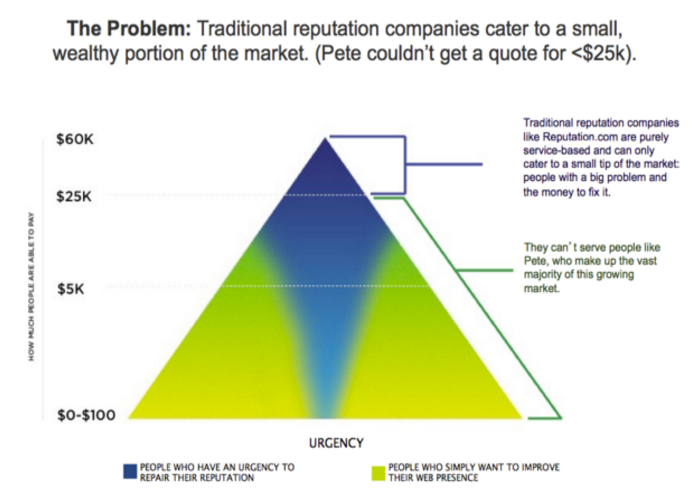
- Search engines evolved faster than their business models, so traditional reputation companies are forced to use antiquated processes that are no longer effective at improving search results. When the online reputation industry began, most companies started as legal teams sending cease and desist letters for clients who wanted negative results removed. As they quickly learned, this process was ineffective. Sites are very rarely legally required to take down a post. Even in the most heinous of circumstances, like revenge porn, the process remains incredibly difficult and frustrating.
They realized the most consistent way to improve search results was to replace or suppress unwanted results with more positive, accurate content. Back then, before search engines became as sophisticated as they are now, they could simply flood search engines with a bunch of profiles, websites, press releases, fake articles and blog comments using someone’s name. Eventually this content would start populating search results, pushing down the old negative results. It was a numbers game. Since content quantity mattered much more than quality, they built a business model around low cost, often outsourcing content creation. For example, they could pay workers in the Philippines pennies to copy and paste bios on hundreds of profiles across the web.
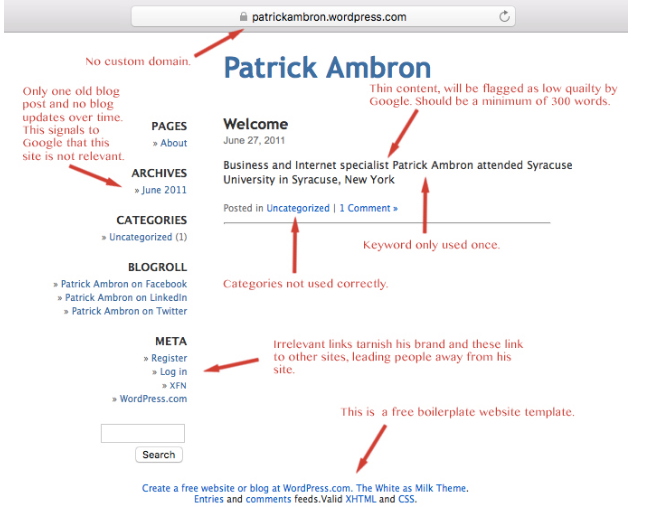
This is a website that a high-end reputation management company created for me. They quoted thousands of dollars despite the work being outsourced. As the red arrows indicate, the site is so low quality that it would never rank under today’s Google algorithm.
Today, that no longer works. Google now values quality over quantity. It actively penalizes low-quality content in its search rankings, quickly detecting thin, spammy, or duplicate content and ensuring it doesn’t show up high in search results.
This is a website that a high-end reputation management company created for me. They quoted thousands of dollars despite the work being outsourced. As the red arrows indicate, the site is so low quality that it would never rank under today’s Google algorithm.
Modern search algorithms now care about relevancy: does a web page have thorough and useful content, links from other authoritative sources, and social “likes” and shares? Is it continually updated over time with fresh information? Increasingly sophisticated algorithms began making the old reputation management tactics obsolete. As the founder of former competitor Brand.com, Rich Gorman, said,
“Essentially overnight all of the tools that we utilized didn’t work. Google even went so far as to remove both Brand.com and Reputation.com from its search engine….”
Case in point: traditional companies using outdated tactics began going by the wayside. Brand.com client, Seattle City Light’s chief of staff Sephir Hamilton, described via ArsTechnica:
“We were told that they would provide help in getting some of our past material and news releases placed in reputable blogs and journals and ultimately didn’t know that they would be paying for placement or creating fake news websites to place that news. And ultimately, all of the material that was generated has been taken off search results because it violated Google’s policies.”
The ArsTechnica article continues:
“E-mails from City Light show that Justin DeLisi, a Brand.com campaign manager, provided links to “stories” posted to websites that have since been pulled down and that appear to have been utterly fake. The “whois” information on those domains, which include weeklytimes.com, gazers.com, and advisories.com, is also obscured.”
To improve your search results, whether you’re burying a slanderous post from an ex, or just trying to make sure your latest professional accomplishments are visible, you need to follow a long-term process.
| Build high quality branded properties | First, you need an arsenal of high-quality websites and social profiles that communicate a strong professional brand. The key word here is high quality. These are the properties that will eventually outnumber and suppress negative or irrelevant results, but that won’t happen if Google recognizes a low-quality effort with sparse or useless content. |
| Make sure those properties are Search Engine Optimized | To maximize the chance that your properties outrank unwanted results, you need to implement comprehensive Search Engine Optimization best practices. Thankfully there are many tools out there that can walk you through this process. |
| Consistently publish content on those properties | This cannot be emphasized enough. If your properties look stagnant, Google won’t consider them relevant enough to rank high. You need to consistently publish high-quality, unique content in various formats and share it across your web properties. When done continually over time, this signals to search engines and searchers that your properties are trustworthy and should rank higher in the results. |
| Begin growing an audience | This is more of a by-product of step 3, but still very important. Views, shares, and other forms of social engagement all contribute to higher search rankings. If your content isn’t consistent or high quality, you won’t get the engagement you need to rank above unwanted results. |
| Give it time | It’s important to understand that you need to put the work in upfront before you reap the benefits. The length of time a property exists is an important factor of Google’s algorithm. Unfortunately, new properties are unlikely to outrank more established results immediately. However, publishing new content and earning social engagement over a period of time will eventually make that result rank higher in search results. |
The process above can be very effective, but it doesn’t work if your business model relies on creating low quality content for a lower cost. That’s why many of these traditional companies are struggling or simply shutting down.
Since their business models only support outdated, ineffective methods, they are forced to deceive consumers to get customers
- Other ORM companies mystify the process they use: The only way for traditional ORM companies to hold onto obsolete tactics is to purposely mystify what they’ll actually do for you. Many claim to have “proprietary methods” that are “guaranteed to work” and refuse to explain them, keeping their methods frustratingly vague. Most consumers don’t fully understand how search engines work, so companies will try to impress them with technical jargon rather than explain to them how a campaign will actually work in plain English. While this is an effective way to bring a customer in the door, it’s not a long-term strategy to keep them. When “proprietary secrets” don’t work, it leaves a bad taste in customers’ mouths and hurts the industry overall. Customers should understand that fixing their situation is indeed possible – it’s not rocket science, it just takes some commitment and hard work.
One way the industry can reduce negative customer sentiment is by explaining the process to clients more thoroughly. Some companies don’t explain to clients that this is a lengthy process. To see real change, your online reputation needs to be in it for the long haul. Companies that are honest up front about this will serve customers who understand what the process entails and see the big picture.
- They make outrageous guarantees and promise “quick fixes” so they can demand money upfront: Online reputation management is no longer a quick fix. You can’t simply create 10 websites and push them to the top of your search results in a month. You need to continue creating great content over time to build a long lasting reputation online that ranks high in search results.
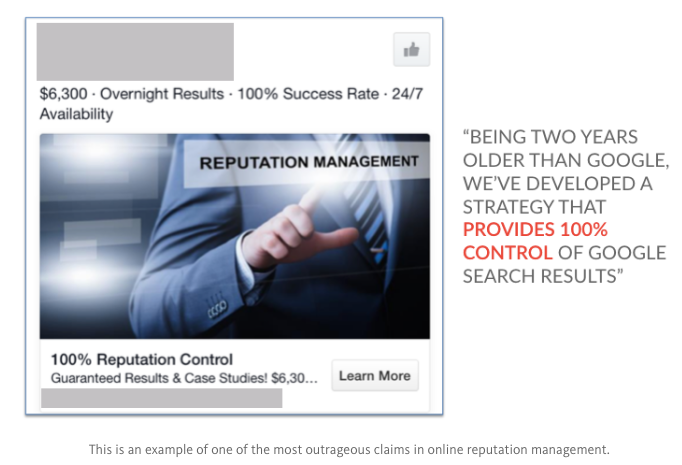
Yet many companies maintain their model of asking for cash up front for 2-3 months of service. They pair this with a tempting guarantee. The issue is, these guarantees are deceiving— they are very rarely money-back guarantees. Instead, companies will often claim that if the issue isn’t fixed, they will continue doing work free of charge. While this sounds great, since the methods are “proprietary” there is no way to know if they are actually doing anything for you. You’re left with a perpetual problem and no money back.
New approaches are better for customers, and will help set a new standard for the industry moving forward.
The issues above are problems with traditional business models, not with the demand for reputation management. Moving forward, the industry needs to change – and many of the steps BrandYourself has take is leading the way.
1. The tools and services to take control of your reputation need to be available to everyone, not just the wealthy.
At the end of the day, this is a business. But that doesn’t mean online reputation is a business exclusive to the wealthy. Instead, BrandYourself prides itself on being accessible to anybody who needs online reputation management. With the market growing, companies would be wise to give customers of varying financial means access to its services.
This benefits all sides in the process. Those that can’t afford higher-tier services can still manage their online reputation, possibly upgrading to a more robust package if and when they are able to. By granting access to everyone, each individual has the opportunity to experience what the service has to offer. At BrandYourself, we’ve seen many clients enter on free or lower cost services before deciding to further invest in a more thorough campaign. Additionally, those that decided to stay on free and lower cost services continue to send us positive feedback because BrandYourself provided them with the tools they need to reclaim their online reputation at a price they could afford. This enhances word of mouth marketing for our business while providing as many individuals possible access to our platforms.
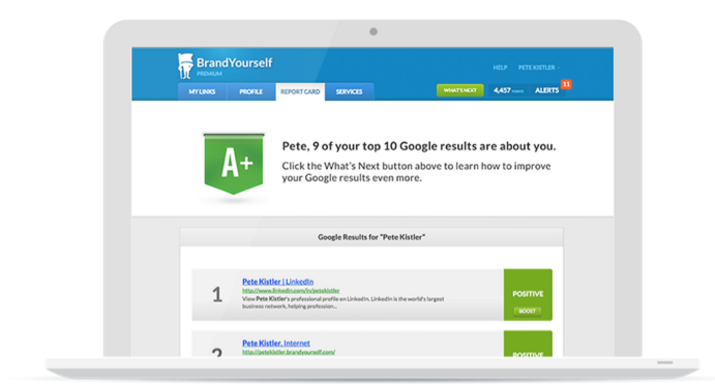
2. Since there are no more “quick fixes” to influence search results, reputation companies need to become more transparent about their timeline and processes – creating lasting relationships based on honesty and transparency.
The old days of quick fixes – bots automatically generating profiles, outsourcing low-quality creation overseas for virtually no cost, stuffing pages with keywords, and buying a bunch of links to boost up positive results – are over. These dishonest “quick fix” tactics now get flagged and penalized by search engines. Today, the key to reputation management lies in creating, managing, and optimizing high-quality content (profiles, websites, blogs, rich media, etc.) that is actually relevant and useful to searchers.
That means the relationship between service providers and their customers needs to change.
At BrandYourself, we’ve taken many efforts to do so. Companies looking to do the same should consider these steps:
-
- Empower, not exploit. This happens by implementing transparency. Never “mystify” the process. Make the entire process specific and clear to the client – detailing every step right down to the cost. BrandYourself even recommends that people take a crack at doing the work themselves, using our freemium tools to help them along the way.
- Never make a guarantee. Even if that’s all a person wants to hear. No one can guarantee what Google will do, and customers need to understand that before spending their money.
- Set realistic expectations. Results typically don’t change in a few months. People need to understand these are long-term commitments, even if they want changes to happen immediately. At BrandYourself, we make sure our tactics help even if their full goals aren’t achieved.
- Offer flexible payments rather than force people to pay entirely upfront. We allow people to pay us over the course of the campaign, which is unheard of “accountability” in our industry. It helps customers understand and check in on the work being done to eventually see results.
- Invest in the work. By hiring smart, in-house, ethical people instead of outsourcing cheap labor overseas, a company creates an open line of communication. This lets the client speak directly with the people actually executing the campaign.
We believe all companies should operate like this. But it poses a problem for traditional business models: it’s expensive to hire a talented labor force that can create extremely high-quality search optimized content. Instead, money is spent on expensive radio placements, tv ads, etc. Their astronomically high “cost per acquisition” doesn’t support an equally expensive labor force to properly service those customers. To stay afloat, most cut costs on labor quality, resulting in poor service.
Contrast that with BrandYourself. We offer a wide range of freemium do-it-yourself tools, all the way up through more expensive services. Since our free/inexpensive DIY tools spread naturally through word of mouth, we grow organically. We don’t need to spend millions on radio or TV ads like traditional companies. Our uniquely low cost per acquisition means that instead of spending on ads, we can invest money directly into our services, ensuring the highest quality possible and keeping content creation in-house. On top of that, the very technology we’ve built to power our DIY tools makes us much more efficient on the service side.
We believe more companies will follow and offer more transparency, because customers are demanding it and are seeking companies that do business this way.
The industry needs to do more than help people repair problems. It needs to help people prevent problems and proactively improve their presence.
Perhaps the biggest issue with the ORM industry: it’s only useful if you already have a problem. But every professionally minded person should be actively monitoring, protecting, improving, and shaping the way they look online. Think about it. Even before you enter college you need to make sure you aren’t posting things on the web that can later keep you out of school.
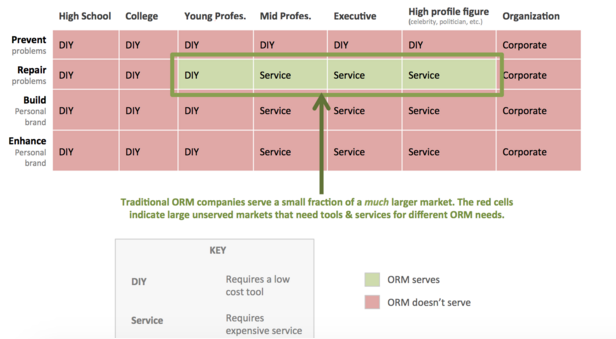
The ORM industry largely only serves people with problems, often missing an array of professionally-minded people in need of reputation management.
The companies that win will be the ones who provide simple, easy to understand tools – with clear value propositions – that help people take control of all aspects of their digital lives.
For example, BrandYourself currently helps you control what shows up when someone Googles your name, but we’re building tools that will help people clean and monitor their Instagram feeds and Facebook profiles before a job interview. We’re building tools to help you identify and remove exposed private info you don’t want exposed. We will continue to make our tools more comprehensive, using machine learning, natural language processing and image recognition to accurately identify items online that could affect your reputation.
It’s important ORM companies continue to innovate – because as the web evolves, so do the needs of consumers.
We’re working on tools to help you prevent or delete posts that could damage your career down the line.
Conclusion
Let’s recap:
- Although traditional reputation management companies seem to be struggling, the market is actually growing. Simply put, the more we live our lives online the more vulnerable we all become to potentially damaging content.
- While the market is growing, traditional reputation companies are struggling, because their business model isn’t built to support that growth. Google’s algorithm has evolved, and it has improved the quality of search results for searchers. And in the process, it’s rendered manipulative “quick reputation fixes” ineffective, leaving many in the industry in turmoil.
- Since their business models only support outdated, ineffective methods, they are forced to deceive consumers to get customers. This just needs to stop.
- There are new approaches that are better for customers. These will help set a new standard for the industry going forward. That’s why we began BrandYourself. Rather than stay the course, we wanted to approach the industry at a different angle. We believe that customers deserve the best management possible at an affordable rate.
- On top of that, the industry needs to do more than help people repair problems. It needs to help people prevent problems and proactively improve their presence. As I stated in the graph above, the industry currently serves those in need of reputation repair. However, a much larger base of customers could benefit from reputation management services. BrandYourself is working to reach these customers.


